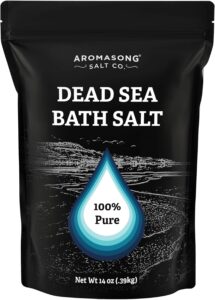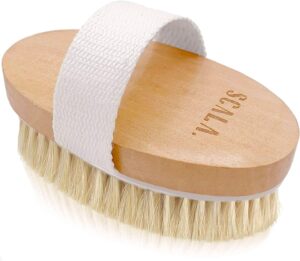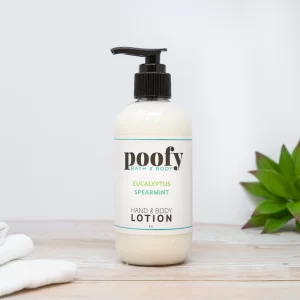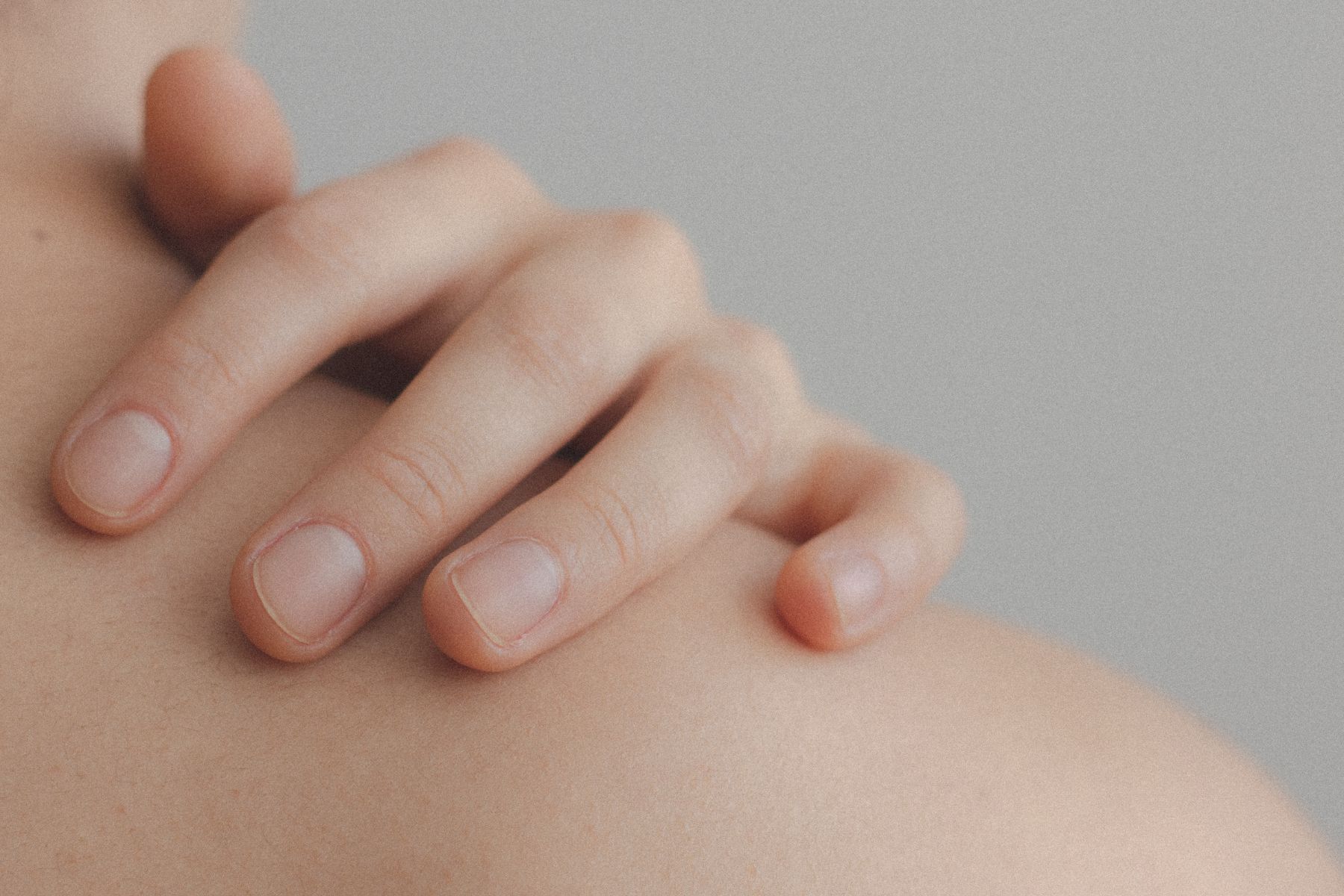I don’t know about you, but my skin can ALWAYS tell when it’s the most brutal time of winter.
If I have not been taking pre-active measure of taking care of my skin (which has been the better part of 15 years since being a Mom), then it SHOWS.
But thankfully, it doesn’t show too much because YAY for long pants and sweatshirts. Am I right?!
Even with all of the coverings from head to toe, there is just something bothersome about dry, flaky skin in the winter.
And if you’re a human being (which I am banking on that you are), then you have probably had your fair share of dry skin struggles during the winter too.
Unless you have God-like genetics, everyone, at one point or another, deals with dry skin. Especially during the cold, winter months.
This is because the air is more dry and there’s less moisture to keep your skin hydrated.
In turn, this QUICKLY (and mercilessly) creates dry, flaky skin that only persists if you don’t take measures to prevent it.
But, as annoying as it can be, there is hope to have supple, moisturized skin even during the coldest months of the year.
Even if you live in the most frigid climates, you can combat dry winter skin with a few natural methods.
Here are a few of my favorite (and personally tested) ways to combat dry, winter skin.
This post contains affiliate links that help support the content on callhercrazy.com. All opinions are my own.
Dead Sea Salt Baths
This might seem counterintuitive, but soaking in dead sea salt baths a few times a week is AMAZING for skin hydration.
I first discovered the amazing properties of dead sea salt during my 4th pregnancy.
I soaked a few times a week to absorb the trace minerals, but I noticed very quickly that it left my skin feeling soft and supple. Even during the middle of winter. Even when I didn’t moisturize!
This works because the magnesium in the sea salt hydrates your skin by directly strengthening the skin’s lipid barrier. If you start to take sea salt baths, you’ll notice that your skin doesn’t wrinkle or prune, which is evidence that it helps retain its moisture.
Other benefits of dead sea salt
Sea salt baths aren’t just a great way to keep your skin hydrated during the dry, winter months, they also have so many wonderful health benefits!
Did you know that the Dead Sea is renowned as nature’s fountain of youth?!
Dead Sea salt is loaded with minerals like Silica, Zinc and Calcium that boost your skin’s vitality and slow the aging process. Yay for natural anti-aging! These minerals help fight off oxidation in skin cells by eliminating free radicals, helping your skin look younger and more vibrant.
Other benefits include:
- Hydration
- Removal of dead skin
- muscle recovery
- skin condition relief such as eczema & psoriasis
- acne treatment
- dandruff treatment
- cellulite minimizer
- stress relief
- detoxifies
If you like taking a good long soak at the end of the day, adding a handful of dead sea salt to your bath will do your skin (and your overall health) wonders!

Personally, I have found this dead sea salt to be the best price and quality. And when you buy in bulk, it will last you all winter!
Stay hydrated!
Keeping your skin hydrated is as much an inside job as it is an outside job. If your body is dying for water on the inside, then it will show on the outside.
Personally, I find it harder to stay hydrated in the winter, which I know why my skin can start to get a little bit dry. But increasing fluids can help increase your body’s overall hydration levels.
The stratum corneum, the top layer of skin, serves as a barrier to help the body retain moisture and defend against outside influences. To keep this barrier functioning properly and intact, proper hydration is required. Skin can become dry, flaky, and more vulnerable to harm when it is dehydrated.
In simple terms, staying hydrated impacts your overall skin health.
If you find it harder to stay hydrated during the colder months, try sipping on hot teas, soups with bone broth, and increasing your salt.
Exfoliate & dry brush
Exfoliating your skin regularly will help keep your skin smooth for a few reasons.
First of all, exfoliation removes dead skin cells and flaky, dry skin. This is what gives off the appearance of healthy, glowing skin – even in the winter!
You can either exfoliate with a body scrub in the bath (double whammy while you’re soaking with your salts) or use a dry brush BEFORE bathing.
Dry brushing is what it sounds like. You use a natural bristle brush (like this one) and brush your skin in downward strokes
Other benefits of dry brushing
Dry brushing isn’t just a soft skin beauty hack, it’s also AMAZING for your overall health.
In addition to getting glowing skin that’s more moisturized, you can also reap many other benefits such as:
Improved circulation. Proper circulation is key for maintaining optimal health. It ensures that blood and oxygen continuously flow throughout the body, allowing every organ to function properly. It helps to heal wounds faster, it keeps your brain sharp, it keeps your heart healthy, and it even can
lymphatic massage. When you brush along your lymphatic system, you can drain sluggish fluid that can improve your health in so many ways including digestion, immune health, swelling, weight loss and water retention, and stress reduction.
skin detoxification. Your skin is your body’s largest organ. When you dry brush, you are removing dead skin, buildup, and pollutants that can clog the pores.

If you aren’t dry brushing yet, add this baby to your cart and get to it! Dry brushing + a sea salt bath = instant youthful skin.
Use a water filter
Minerals can be good for your skin (like the kind in dead sea salt), but the kind that are found in your water at home are NOT.
The minerals left behind by hard water can upset the natural oil balance in your skin and even block pores, thereby causing irritation and you guessed it. DRY SKIN.
This is why using a filter in your shower (and in your bath) is a smart & easy way to avid dry skin.
Other drawbacks of bathing in hard water
This isn’t just surface-level. There are other drawbacks of bathing in hard water other than just dry skin alone.
Unwanted mineral absorption. Your skin is the biggest organ and literally absorbs things like a sponge. A good rule of thumb when it comes to putting things on your skin is if you wouldn’t consume it, then you shouldn’t bathe in it. If you filter your water, but not your shower, then it might be time to consider the health benefits of using a filter.
Poor hair health. You likely don’t have dull hair that easily breaks. The most likely culprit (besides the hair products that you use), is your water! When you bathe in hard water, the mineral buildup can stay on your hair leading to damage, dryness, and dull strands.
Skin issues. Not just dry skin though, hard water can also clog your pores and upset the pH levels of your skin (which can lead to all sorts of issues).
If you don’t have a water softener, then by Jove, get yourself a shower filter! They aren’t that expensive and they are super easy to install. You can also get a filter to use for your baths – I recommend something like this.
Using filters in your shower and bath is a very inexpensive way to filter out those drying minerals that only contribute to your lackluster dry, winter skin.
Turn on a humidifier
Since lack of moisture is the biggest issue when it comes to dry skin in the winter, then it only makes sense to add some humidity to the air!
Using a humidifier in your home (especially where you sleep) can help combat dry skin, among other things.
Other benefits of using a humidifier in the winter
Reduces snoring. One study conducted by Swedish researchers found that sleep apnea patients who used continuous positive airway pressure (CPAP) machines with built-in humidifiers were more likely to adhere to treatment and experienced fewer upper airway symptoms, like dry mouth, nasal congestion and snoring.
Combats viruses & illness. Some viruses, such as the flu, are easier to spread in colder, dry environments. When humidity is increased, the virus can not spread as much. This study shows that there were 2.3 times more cases of flu virus in a room that was not humidified compared to one that was.
May help relieve headaches. If you suffer from sinus or dehydration headaches, using a humidifier might help keep them at bay. Increased humidity can loosen up sinus mucus and make the path more clear so that buildup doesn’t occur – leading to congestion and headaches.
Using a humidifier is a cheap & easy way to improve your overall health in the winter and combat dry skin!
Ditch products with petroleum & mineral oil
Mineral oil is an odorless, clear liquid derived from petroleum. The liquid is a highly purified and processed petroleum product which under some cases, can be bad for the environment because it is not biodegradable.
Not only that, but mineral oil doesn’t help to moisturize the skin.
Mineral oil acts as a barrier to keep moisture & hydration in. In other words, it does not absorb into the skin to moisturize.
Those with sensitive skin, mineral oil can actually clog pores and cause break outs.
Instead, reach for more natural moisturizers & lotions to help keep your skin supple and soft. These aren’t just better for your skin, they are better for the environment because of their ingredients and how they are made.
Use Natural oils & lotions to moisturize
I love me a good body lotion (this is my favorite) to help keep my skin hydrated, but when the air gets extremely dry, then it’s time to pull out the big guns.
During the driest time of the year, using a body oil helps so much to retain moisture and keep the skin nourished for hours, sometimes days.
Yes, DAYS.
But, not all body oils are created equal. You might think that using an oil will be a more clean and natural option, but sometimes they contain harmful chemicals that should be avoided.
Ingredients to avoid in a body oil & lotion
Mineral Oil – provides a false sense of hydration. Petroleum jelly or mineral oil as it’s also referred to can feel moisturizing, but it in fact is dehydrating and once it wears off, you’ll need to reapply. Petroleum creates a waterproof coating that can also trap bacteria and dead skin cells. Due to the oil refining process, petroleum is frequently contaminated with 1,4-dioxane, which is incredibly harmful to people and the environment.
Parabens – can dry out the skin’s barrier. Commonly used as a preservative to prevent the growth of bacteria. Butyl, propyl, and ethyl parabens are endocrine disruptors that have been linked to cancer. Yikes!
Fragrance – a blanket term that can hide a multitude of harmful chemicals such as phthalates, which are known hormone disruptors and can contribute to respiratory conditions.
Propylene Glycol & PEG’s- (This includes -4, -6, -8…etc) Has been found to be contaminated with 1, 4 dioxane, which is cancer causing. Can cause acne and a general skin irritant. This ingredient actually helps other ingredients penetrate deeper into your skin. So not only are you getting exposed to this harmful chemical but you’re also helping other harmful chemicals dive deeper into your skin!
BHA & BHT– Known hormone disruptors, carcinogenic, and have been linked to liver damage. They are in body oil products or lotion as a preservative.
Canola Oil- Now this might not be toxic to your body topically, but most canola oil produced is genetically modified(GMO) and is inflammatory when ingested. I’ve seen this on so-called natural brands. If you see this on a label be wary of the company. This is a cheap way to produce body oil. Who wants to be rubbing GMO’s all over their skin? Not me!
Stearalkonium Chloride– Reproductive toxicity, potential negative effects on the nervous system and can cause irritation to the skin and eyes. Hard pass
Best oil options for your skin
Jojoba oil. This oil is similar to your body’s natural oils, making it a great option for skincare use (and why it’s so popular in many natural products!). This oil is also non-comedogenic so it’s not going to clog your pores. the one downside that I have encountered with this oil is that it’s a little bit greasy when too much is applied, so a little bit goes a long way!
Rose Hip Seed Oil. This oil is naturally very soothing. It contains both Vitamins C and A. It helps reduce redness, helps fight sun damage, and brightens skin. Research has shown that Rose Hip Seed Oil can protect against inflammation and oxidative damage.
Argan Oil. Known for evening out skin tone, hydrating, and helping improve overall elasticity as well as scars. Scientific studies have revealed that argan oil is an effective moisturizer for individuals with dry skin, due to its capacity to aid in the restoration of the skin barrier and enhance the skin’s ability to retain essential moisture.
Sesame Oil. It’s anti-microbial, anti-inflammatory, also an oil filled with antioxidants. Vitamin E is rich in sesame oil which can help with free radical damage from environmental factors. The antibacterial properties of sesame oil can help eliminate blackheads, whiteheads, and other types of stubborn acne.
Avocado Oil. Rich in chlorophyll which naturally brightens the skin. Very hydrating and helps relieve inflammation.
Almond Oil. Has Vitamins, A, E and B which help to seal moisture into the skin. It’s a very hydrating and nourishing oil. It also is anti-inflammatory and can help reduce puffiness around the eye area. It’s also great for skin tone.
Macadamia Nut Oil. A great rich oil that doesn’t feel greasy, melts right into the skin. Also, anti-inflammatory. It has linoleic acid in it which helps to restore skin’s barrier function & has impressive natural anti-aging properties.
My favorite body lotion to use in the winter
When it comes to using body lotions, it has to be natural with clean ingredients – not the green-washed garbage that’s found on the top self at Kroger. I’ve found that I really LOVE Poofy Organics Body Lotion.
A little bit goes a long way & it helps keep my skin so nourished even on the driest days!

My favorite way to apply the lotion is fresh out of a sea salt bath after exfoliating. It’s truly the triple threat of combating dry skin!
Use this code to get 10% off: HEATHERFORD10
Looking to ditch your current products and switch to safer options?
Check out my product reviews here (with even more to come!)
Try out more DIY non-toxic recipes here
Shop my FAVORITE products here. These are products that I use daily and are fully vetted to be safe & natural choices.
